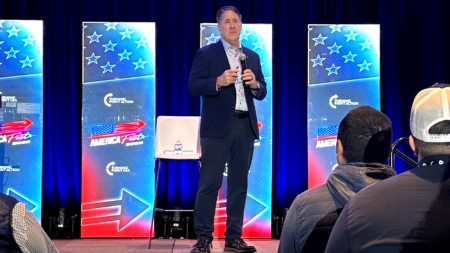The Trump of Peru: How Rafael López Aliaga’s Brash Style Has Propelled Him to Presidential Frontrunner
In the heart of Lima’s historic district, Rafael López Aliaga stands before a roaring crowd, his voice rising above the din as he rails against corruption and promises to transform Peru. His unfiltered rhetoric, business background, and confrontational approach to politics have earned him a nickname that seems to follow populist conservatives across the globe: “The Trump of Peru.” As the Andean nation prepares for its next presidential election, López Aliaga has emerged as a formidable contender, channeling a political playbook that has proven effective from North America to South America and beyond.
The rise of López Aliaga represents more than just another presidential campaign in Peru’s volatile political landscape; it signals the continued global resonance of a political style defined by direct communication, anti-establishment messaging, and the blurring of lines between business success and political qualification. As traditional parties struggle to connect with voters disillusioned by decades of corruption scandals and unfulfilled promises, López Aliaga’s brash approach has tapped into a powerful current of public sentiment that craves authenticity—or at least the appearance of it—over political polish.
From Businessman to Political Phenomenon: The Making of a Peruvian Populist
Rafael López Aliaga didn’t emerge from the traditional political pipeline that has produced most of Peru’s presidents. His background as a successful businessman—with investments spanning transportation, hospitality, and real estate—mirrors the outsider credentials that Donald Trump leveraged in his unlikely ascent to the American presidency. López Aliaga frequently references his business acumen as evidence of his capability to govern efficiently and profitably, positioning himself as someone who can apply private sector principles to public administration.
“Peru doesn’t need more politicians; it needs results,” López Aliaga declared during a recent rally in Arequipa, where thousands gathered to hear his vision for the country. “I’ve created jobs and built successful enterprises. I know how to make things work.” This messaging resonates particularly well in a country where the formal economy struggles to absorb the workforce and where many citizens operate in the informal sector. By emphasizing his credentials as a job creator and economic driver, López Aliaga appeals to Peruvians’ desire for prosperity and opportunity in a nation that has experienced economic growth but uneven distribution of its benefits.
Beyond his business background, López Aliaga has cultivated an image as a devout Catholic with conservative values, a stance that connects with many traditional Peruvians, particularly outside the capital. His open discussion of his religious practices—including claims of extreme physical mortification as spiritual discipline—adds another dimension to his public persona that distinguishes him from the typically more secular presentation of Peruvian politicians. This religious authenticity, combined with his business credentials, creates a multilayered appeal that crosses various demographic lines, from urban entrepreneurs to rural conservatives.
The Power of Provocation: How Confrontational Politics Builds a Base
The parallels between López Aliaga and his North American counterpart extend well beyond their business backgrounds. Both have mastered the art of political provocation—the calculated deployment of statements designed to generate maximum media attention and emotional response. When López Aliaga refers to political opponents as “corrupt maggots” or dismisses critical journalists as “paid hacks,” he’s not merely expressing frustration; he’s engaging in a deliberate strategy to dominate news cycles and frame political discourse on his terms.
“Every time the media erupts in outrage over something López Aliaga has said, they’re playing directly into his strategy,” explains Peruvian political analyst Carmen Rodríguez. “The more controversial his statements, the more coverage he receives, and the more his supporters feel he’s fighting against an establishment they’ve grown to distrust.” This dynamic creates a self-reinforcing cycle: provocative statements generate media attention, which reaches potential supporters, who appreciate his willingness to “tell it like it is,” which encourages further provocative statements.
Social media amplifies this approach exponentially. López Aliaga has built a substantial following across platforms, where his unfiltered messaging reaches Peruvians directly, bypassing traditional media gatekeepers. His social media presence combines policy pronouncements with personal attacks on opponents and behind-the-scenes glimpses of campaign life, creating a sense of intimacy and authenticity that traditional political communication often lacks. For supporters, following López Aliaga online feels less like engaging with a political candidate and more like connecting with a truth-telling movement.
Nationalist Messaging in a Globalized Age: Economic Protectionism with Peruvian Characteristics
“Peru First” could easily be López Aliaga’s campaign slogan, mirroring the nationalist messaging that has proven effective for populist leaders worldwide. His economic platform centers on protecting Peruvian industries, questioning international agreements that he claims disadvantage local businesses, and promoting domestic production over imports. This economic nationalism resonates in a country that has experienced both the benefits and disruptions of globalization, with some sectors flourishing while others struggle against international competition.
“We cannot continue allowing foreign interests to extract our resources while our people remain poor,” López Aliaga told business leaders at a Chamber of Commerce event in Lima last month. “Peru has everything it needs to be prosperous—natural resources, hardworking people, strategic location. What we’ve lacked is leadership that puts Peruvians first.” This message strikes a chord in a resource-rich nation that has seen waves of foreign investment in mining, energy, and agriculture, yet continues to struggle with poverty and inequality.
López Aliaga carefully balances this economic nationalism with reassurances to the business community that he respects property rights and contract law—key concerns in a region where leftist governments have occasionally nationalized industries or renegotiated terms with foreign investors. “I’m not against foreign investment,” he frequently clarifies. “I’m against unfair deals that don’t benefit the Peruvian people.” This nuanced position allows him to appeal simultaneously to working-class voters concerned about economic security and business interests worried about radical policy shifts.
Media Relations and the “Fake News” Strategy: Controlling the Narrative
Perhaps one of the most striking similarities between López Aliaga and Trump is their adversarial relationship with mainstream media outlets. López Aliaga regularly accuses Peru’s major newspapers and television networks of bias, manipulation, and serving hidden agendas. When confronted with unfavorable coverage or fact-checking of his claims, he typically responds not by engaging with the substance of the criticism but by attacking the credibility and motives of the media organization itself.
“The dying newspaper industry is desperate to maintain its influence,” López Aliaga tweeted recently after a major daily published an investigation into irregularities in one of his business ventures. “They attack me because they know I won’t play their corrupt game.” This strategy serves multiple purposes: it inoculates his supporters against negative information, reinforces the narrative of López Aliaga as an outsider fighting entrenched powers, and undermines one of the few institutions capable of holding political leaders accountable.
Media researchers have noted that this approach creates a troubling information ecosystem where factual reporting is increasingly dismissed as partisan, while unverified claims spread rapidly through partisan networks. “When political leaders successfully convince their followers that traditional journalistic standards are actually evidence of bias, they create a permission structure for dismissing inconvenient facts,” notes media scholar Patricia Mendoza of Lima’s Catholic University. “The long-term implications for democratic discourse are concerning.”
Looking Forward: The Implications of Populist Leadership for Peru’s Democracy
As Peru approaches its presidential election, the possibility of a López Aliaga presidency raises profound questions about the future direction of the country’s young democracy. Peru has experienced significant political instability in recent years, with multiple presidents removed from office and widespread corruption scandals eroding public trust in institutions. In this context, López Aliaga’s strongman rhetoric appeals to voters seeking decisive leadership, even as it concerns those who prioritize democratic checks and balances.
“The greatest risk isn’t necessarily in specific policies, but in the potential weakening of democratic norms and institutions,” warns constitutional scholar Javier Martínez. “When political leaders consistently delegitimize the press, the judiciary, and other independent institutions, they create conditions where power becomes increasingly concentrated and accountability diminishes.” This concern echoes the experience of other nations where populist leaders have gradually eroded democratic guardrails while maintaining popular support through direct appeals to their base.
Yet supporters of López Aliaga argue that Peru’s established political class has already failed the country through corruption, inefficiency, and disconnection from ordinary citizens’ concerns. They see his disruptive approach as necessary medicine for a political system that has delivered inadequate results despite decades of democratic governance. “Sometimes you need someone willing to break things to fix them,” explains María Sánchez, a López Aliaga supporter at a recent rally. “The polite politicians have had their chance. Now we need someone who fights.”
As Peruvians prepare to make their choice, the rise of Rafael López Aliaga demonstrates the global appeal of a political style that once seemed uniquely American but now transcends borders and cultures. Whether his brash approach ultimately leads to the presidency—and what that would mean for Peru’s future—remains to be seen. What’s clear is that the populist playbook pioneered by figures like Trump continues to resonate with voters around the world, adapting to local conditions while maintaining its essential character of confrontation, disruption, and the promise of transformation through sheer force of personality.






